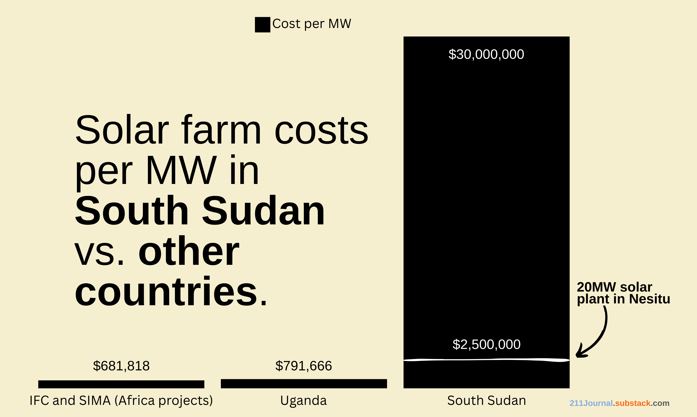BY ATAK NGOR
South Sudan’s national cabinet recently approved a US$150 million solar project for Juba, the capital city. On 2 August, the Minister of Energy and Dams, Peter Marcello, presented a Memorandum of Understanding (MoU) between his office and an unknown company called TPA Company Limited. The project was deliberated and passed unanimously by the national cabinet without opposition.
This unanimous approval should raise alarms, as it suggests that South Sudan’s cabinet is grossly incompetent, complicit in corruption and bribery, and possibly involved in money laundering as well. The reality is that this project should only cost around USD 3.96 million—so who is pocketing the remaining USD 146 million?
According to Deputy Information Minister Dr. Jacob Maiju Korok, the concessional loan for this project has a maturity of 20 years with a five-year grace period. On a different matter, Korok disclosed that the Energy Minister also requested the Finance Minister to pay USD 30 million to an Egyptian company, El Sewedy Electric, following a court ruling. The company had been contracted to build a 20 MW solar power plant in Nesitu, Juba County, the first of its kind, at USD 50 million. Korok explained that the company had sued the Government of the Republic of South Sudan at the International Centre for Settlement of Investment Disputes in the U.S. due to the government’s failure to complete the final payment, despite an initial advance payment of USD 20 million. For the Nesitu solar project, the cost per MW was USD 2.5 million.
“The whole amount was actually fifty million dollars for the project, but the government managed to pay twenty million, and the remaining is thirty million dollars.” Dr. Korok told reporters on 2 August, and added: “So, the company decided to take the government to the court of arbitration in the U.S., and Minister Marcello asked the Ministry of Finance to handle this issue before even moving further to the court.”
Given that the cost of building a 5 MW solar farm should range between USD 3.96 million and 5 million, the fact that South Sudan is paying USD 150 million is nothing short of criminal. For context, Amea Power recently announced a 24 MW solar project in Uganda, costing only USD 19 million, or roughly USD 791,666 per MW, which is drastically less than the USD 30 million per MW that South Sudan is paying. The project is owned by Amea Power, a Dubai-based developer, unlike South Sudan’s solar projects, which require government funding and are constructed by private companies that are not taking on any financial risk. If the money allocated for this project were used properly, it could generate 189 MW and impact 1.44 million people (or 442,500 households).
Furthermore, in February 2024, the International Finance Corporation (IFC), in partnership with Social Investment Managers and Advisors LLC (SIMA Funds) and other financiers, launched a USD 150 million solar green bond to finance productive-use solar projects across Africa. The bond is aimed at funding over 220 MW of solar energy projects on the continent. This means the cost is USD 681,818 per MW which again is significantly lower than Uganda’s solar project.
This USD 150 million solar project highlights the deep corruption that continues to plague South Sudan’s government. There is no legitimate reason to secure a loan or award contracts to companies; ministries should implement projects themselves instead of outsourcing them. If the cabinet were not engaging in corruption or bribery, it would have at least scrutinized why 1 MW would cost USD 30 million, while the 20 MW solar plant in Nesitu only cost USD 2.5 million per MW. How is the USD 150 million solar project costing 12 times more than the Nesitu solar project and 38 times more than Uganda’s solar project? The problem is not just that the government fails to understand the contracts they sign with companies, but also that corruption and bribery lead to unfavorable terms and conditions that are not in South Sudan’s interest.
It is evident that South Sudan’s government is using essential projects as money laundering schemes, diverting public resources to their own pockets and indebting the country further while enriching themselves at the expense of the people. This USD 150 million solar project is a textbook case of corruption and mismanagement. The true winners are not the citizens who desperately need reliable electricity, but rather the corrupt officials who approved it and the company behind it.
The writer, Atak Ngor, can be reached via X, formerly Twitter.
The views expressed in ‘opinion’ articles published by Radio Tamazuj are solely those of the writer. The veracity of any claims made is the responsibility of the author, not Radio Tamazuj.




